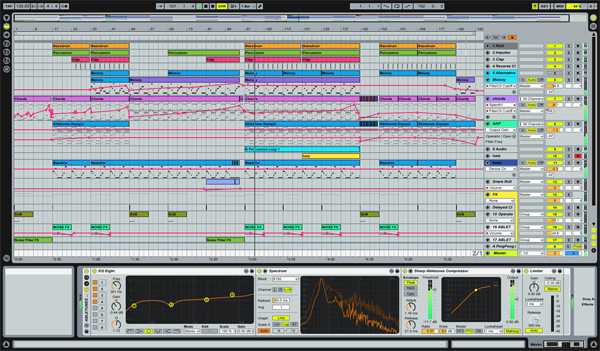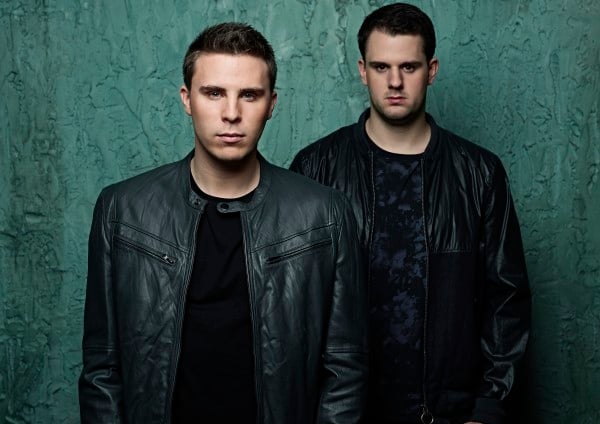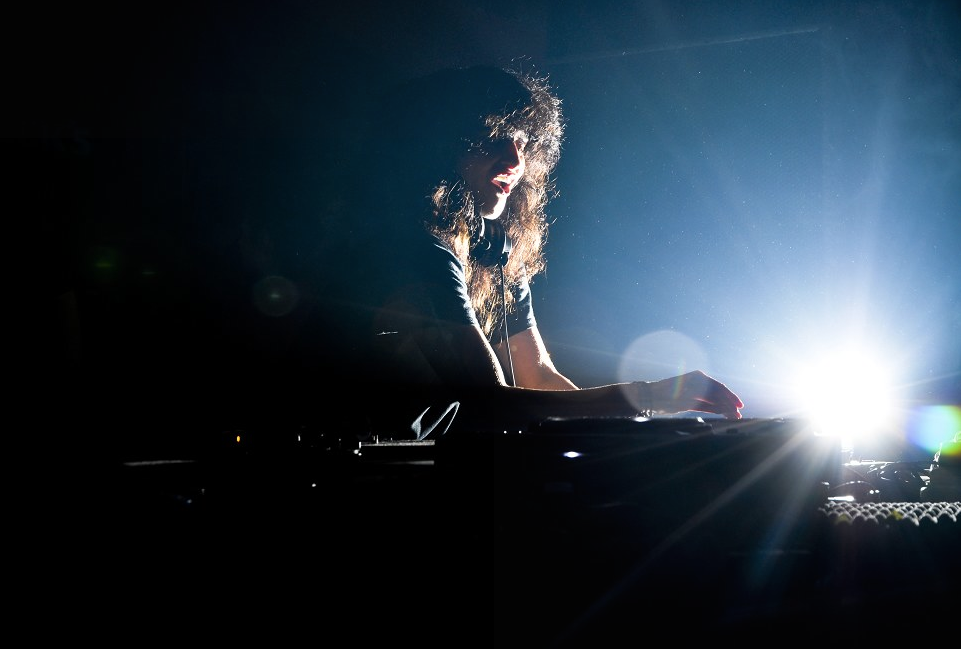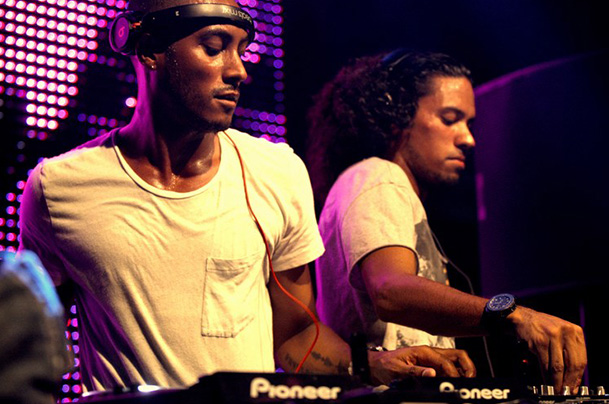During Electric Daisy Carnival Las Vegas, Splice had an opportunity to speak with Gordon Huntley and Erick Muise of Botnek to learn about their collaboration workflow, favorite studio tools, and more. Originally based in Halifax, Nova Scotia, Canada, the duo continues to gain momentum with an ever increasing tour schedule and production schedule to match – including their most recent remix of The Chainsmokers’ “Selfie.”
Nate Mars: Let’s start with one of your latest projects, the new remix of “Selfie.” Can you tell us how that came about?
Selfie – The Chainsmokers – Botnek Remix
Erick: It’s crap. We got asked by The Chainsmokers to do it and we did it. [laughter]
Gordon: That’s the most boring thing ever.
NM: Yeah, can you elaborate a little bit?
Erick: It was an official Botnek remix. We hesitated, at first, to what we wanted to do with it and what we were going to do to the track. But once we had the idea to have the flip on it, the response to the track that everyone’s thinking in their heads it just totally made sense. We’re like, “OK, well, we’ll just go with that as the idea.” It was pretty simple. We made it quickly and didn’t think it was going to have as much of an impact as it did.
NM: Do you find that the better ideas are the ones that just come out quickly and you knock the track out, or the ones that wind up taking more time to produce? Do you ever sit with things and come back to them for months and months…?
Erick: Absolutely.
Gordon: Yeah, we have a lot of stuff like that. The Selfie one was, we made it and we’re like, “Ah, this actually just works perfectly for this,” and came together. That’s more of a rare thing when the track comes together quickly. Whereas we have a lot of tracks that we’ve been working on for a long time and getting it through different stages. And you have different ideas and things change, so…
Erick: We generally work ‑‑ if there’s a deadline, if there’s a reason to finish a track in a week, then it’ll get all of our attention. We have short attention spans, even for our own music, so we generally…If we’re making stuff for originals or whatever, we’ll tend to work on something for a little bit, then work on something else for a little bit. Usually have like six to a dozen or more things we’re simultaneously working on. We don’t usually focus all of our time on one thing, unless it’s a deadline where we have to do everything.
NM: Then, when you say “We,” what’s the We workflow like?
Gordon: For us, starting stuff is like a Lennon/McCartney kind of thing, where Erick will either come up with something and then show me or I’ll come up with something and show Erick. We’ll have ideas for each other and then tag team. I pass it off to him and he works on it for a bit, then he’ll pass it off to me and I’ll work on it for a bit. That’s how things get done.
NM: Since you’re traveling together a lot, is a lot that producing happening on the road, or are you making time in the studio when not touring?
Erick: We definitely make time to hash out specifics together, but a lot of it we start separately. We also were working on Botnek stuff remotely, sending files over Skype and all that…
Gordon: We’re always talking about the songs themselves and what we want to do with them and idea brainstorming and things like that. It’s like, “Oh, we should do something like that.” Then either whoever’s working on the track at the time, they’ll go and they’ll do that.
NM: In terms of specific tools that you’re using in the studio, are you guys using any hardware at all? software?
Erick: We’re super simple. We do everything on our laptops and headphones.
Gordon: We do a lot of the mixing on laptop speakers, because we’re super lazy. [laughs]
NM: That’s how a lot of people are listening these days though.
Gordon: Yeah, and it has to sound good there, too.
Erick: People listening on cheap earbuds and things like that, it’s like, “If it sounds good.” We try and make things sound good wherever. Playing songs out in the club, seeing if it sounds good there. When it sounds good on laptop speakers then it’s going to sound good in other places.
Gordon: Levels‑wise.
Erick: Yeah.
Gordon: You’re not going to know how much bass there is.
Erick: Yeah, no, but whatever.
Gordon: Captain Obvious over here. [laughs]
NM: When it comes to specific DAWs and plugins, what are you guys using?
Erick: Ableton Live. That’s how we became buddies. We were the only two people in our city that knew what Ableton Live was. We come from a small town in Canada and that’s how we started talking.

Ableton Live – Arrange View
NM: Are you using any third‑party plugins along with Live? Can you tell us what are some of your go‑to third‑party plugins? What are some of your favorites?
Erick: Everything by the company u-he. u-he is the best.
NM: What are some of your favorite u-he plugins?
Erick: Diva. Diva’s really good. We haven’t used Ace or the other ones, but Diva’s definitely the go‑to. I haven’t used Zebra either. I’m using the new one though, called Bazille.
NM: Any others?
Erick: I like the whole FabFilter suite, it is really good.
NM: So your workflow is pretty much Ableton Live, on the road, in headphones, and then a lot of third‑party plugins. Do you think that’s unique to your workflow or do you think that that is going to become more and more the thing?A lot of people are saying hardware is coming back.
Erick: Honestly, I love the idea of hardware. I want to own a huge $200,000 modular system, but I don’t have $200,000.
Erick: Its utility, it doesn’t make sense. If I was rich and had lots of money and I had a place to put it, I would love to have that stuff.
Gordon: If you were Deadmau5…
Erick: Yeah, if I was Deadmau5 I would have it, but I’m not.
Gordon: I think it comes down to whatever the function of what you’re doing is. You have to think about, DJs are always traveling so we specifically made that our thing in the beginning. I remember I started with hardware synths. I’d record them and send midi and then record the midi and all this. Then Eric showed me all this stuff that he was doing right on his laptop, I was like, “This is so much better.”
Gordon: Yeah, we got into that, because then you can make changes everywhere. We were working on a track in a social security office yesterday where we were waiting.
NM: When you’re working with other artists let’s say, and you are in the situation of passing files back and forth, are there any pain points to that or things that you wish would improve?
Erick: I think it depends on the person. For Gordon and I, we are very used to our workflow in that we pass ideas back and forth and it works like that. Whereas when you’re in a studio, there are certain people that like the whole collaboration right there, making it happen on the spot. It can work and it’s like what traditional musicians do, but at least for me growing up literally sitting in front of a computer making things and always being by myself making stuff, working with Gordon five or six years ago or however long it was, it was definitely different. I think we have our own little workflow now.
Gordon: We do it on purpose, though. We set up our laptops the same way, with the same plugins, the same everything. Same samples in the same locations, so when we pass them back and forth they open up right away. Especially if you’re working between different DAWs, that can get tricky. We’ve collaborated with guys who use Ableton Live but set things up completely different…
NM: What’s the first thing you notice in a collaborator? When you go to sit down and you’re going to collaborate with a new artist? What’s one of the first things that stands out?
Gordon: If they have a really messy project, I judge them. [laughs]
NM: [laughs] If files are missing…
Gordon: Yeah, stuff is all over the place and they’ve got drums everywhere and synth here and nothing is named.
NM: Are you some kind of production neat freak?
Erick: We totally are.
Gordon: We’re a bit picky when it comes to the mix because we taught ourselves. Now we feel we have a certain standard we like to keep. We will spend a lot of time on the mix, carefully making sure everything fits together and it sounds good.
The ideas usually come quickly. The ideas themselves are done by what we call, “The Manual Labor,” where you’re adding more risers and more boring sounds, the rules of EDM that make it work.
NM: Any advice to share?
Gordon: If you want to be a DJ or a producer, if you want to be either or, or both, do it all the time. If you want to be a DJ, practice DJ’ing, just do it. Even if you suck, keep trying. If you want to be a producer, keep making beats. It doesn’t matter, any kind, whatever comes to your head, do it and have fun doing it. Get frustrated, because then you’ll get better. [jokingly] We’ve wanted to kill ourselves, we’ll be like, “Why doesn’t this thing work,” and then you’ll realize the problem with your mixer, realize why your kick isn’t good, or why everything isn’t sounding…You’ll figure it out, and Google it, or something.
NM: It’s a never ending learning process.
Erick: Yes. We’re always trying to make our mixes sound better. [jokingly] We’ll listen to ours, and then listen to Deadmau5 and cry. [laughter]
Gordon: Neither of us were particularly serious about it in the beginning, because where we grew up, there was absolutely no connection to the music industry, so we did it, and we thought it was just for fun. When we started taking it seriously, that was kind of when the boom was happening, and there’s so much content. Content started showing up online. You could reach out to people online, and that community started building. Now, it’s really cool. I would love to be 16 now and trying to learn how to DJ and produce, because you can go on YouTube and be like, “How to make a filter sweeper,” or “How to make a knife party song.” Some will give you an approximation of it, and then you’ll learn something from it. I still watch mastering tutorials online.
About the Splice Artist Series – We empower music creators to create and collaborate fearlessly. Our goal is to build the best platform possible in order to enable that process. We hope that you learn just as much as we do, hearing from artists about their workflow and how they collaborate. Most importantly after reading, we hope you are inspired to make music!
July 9, 2014





